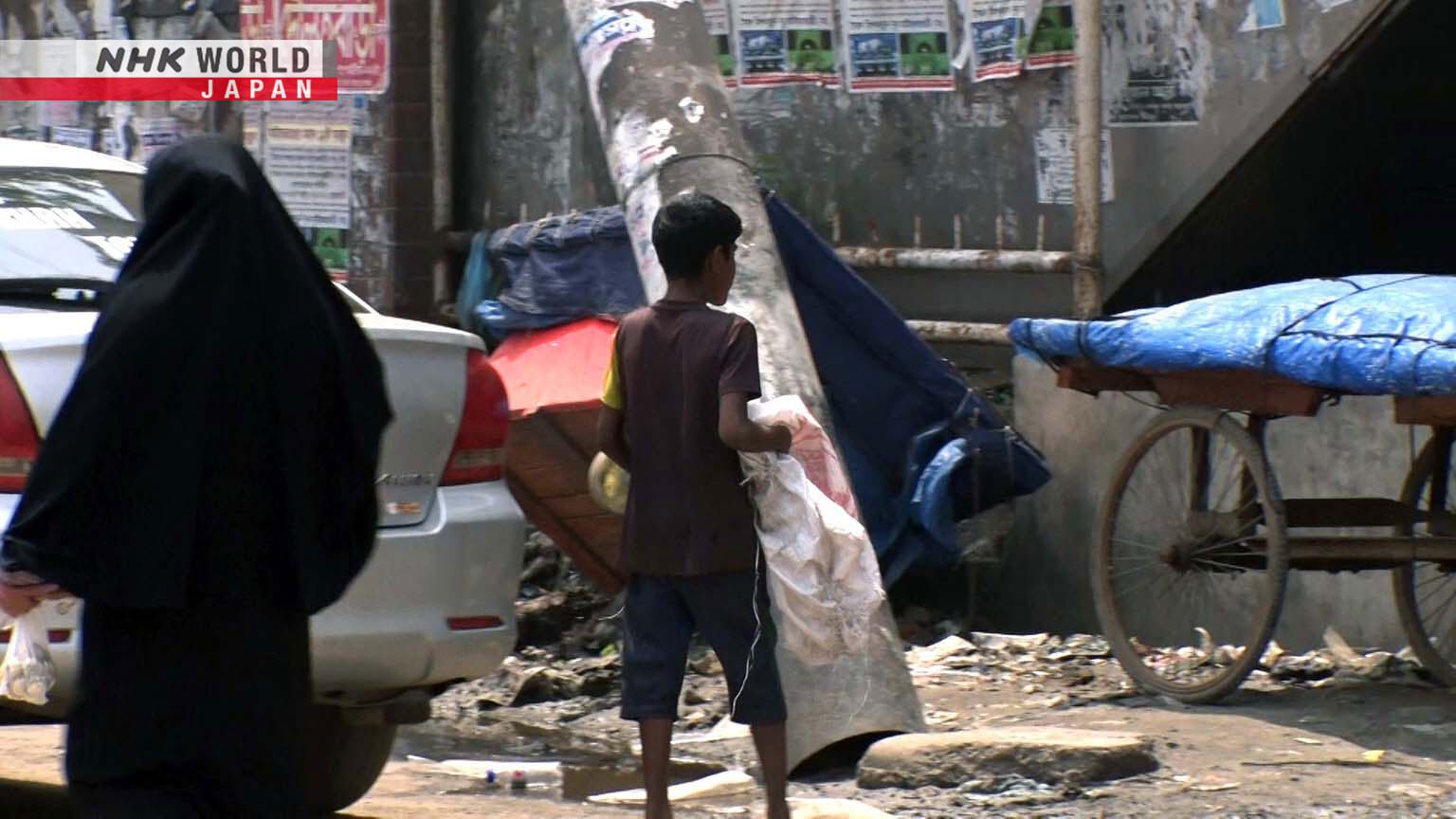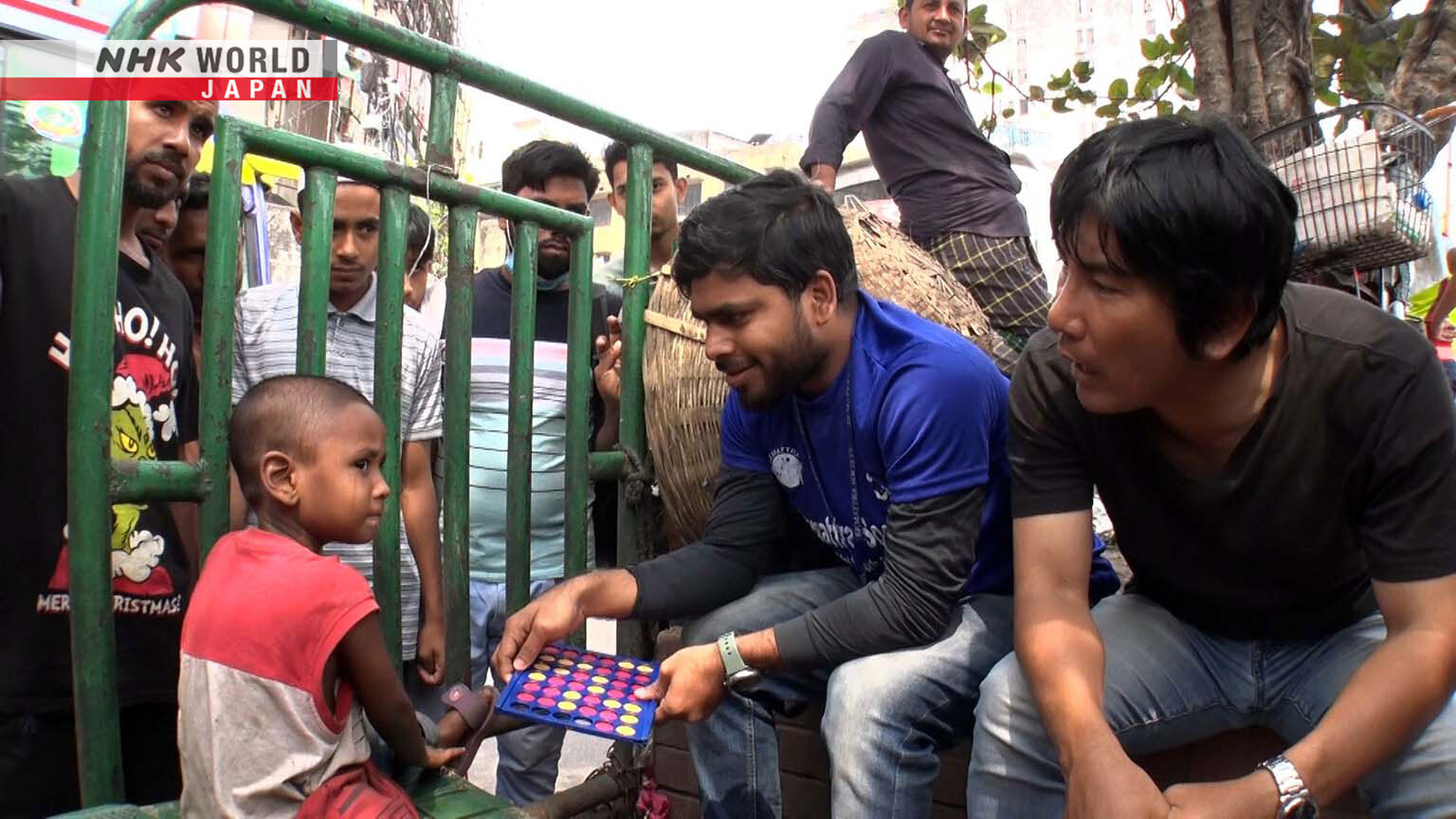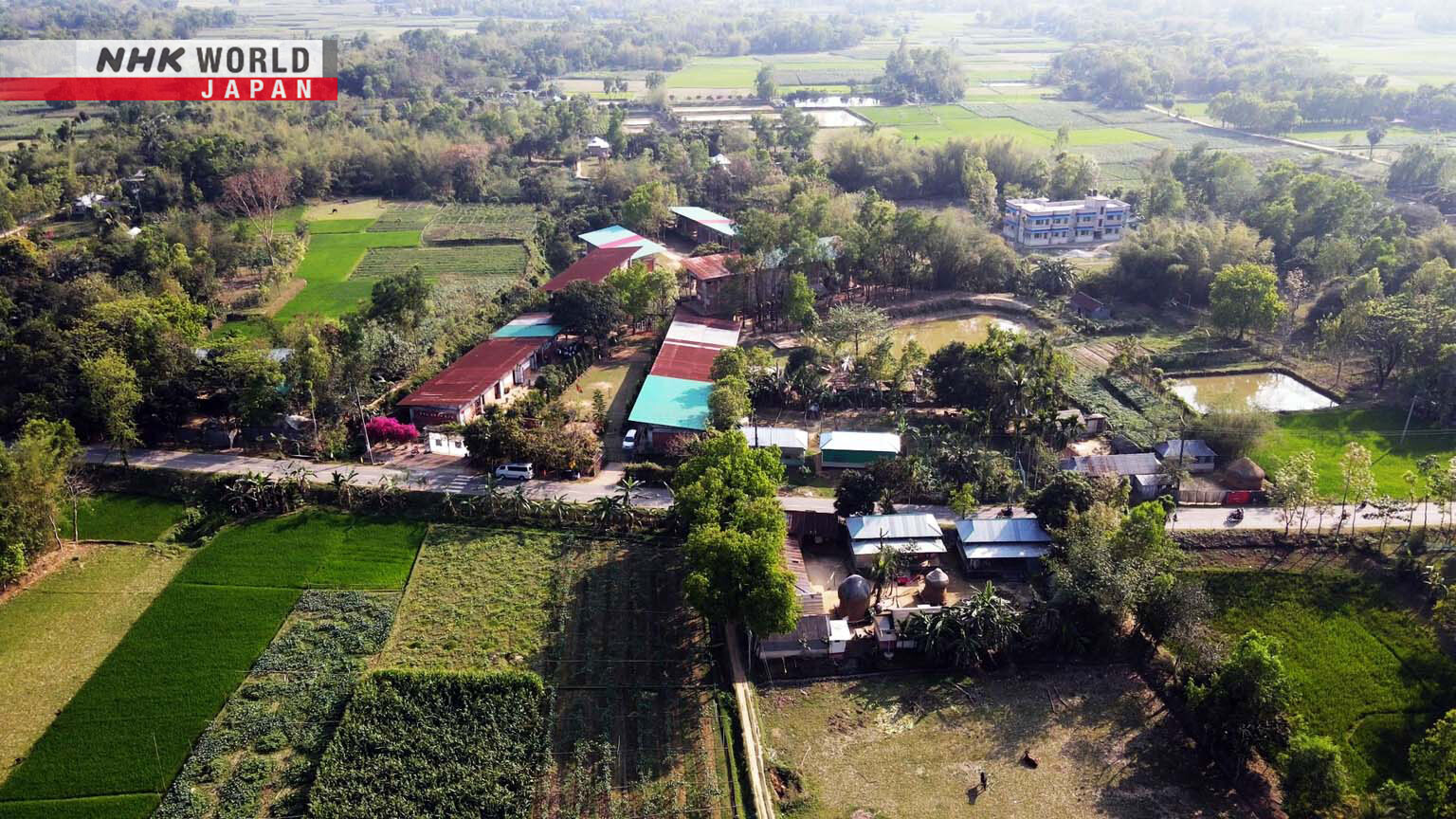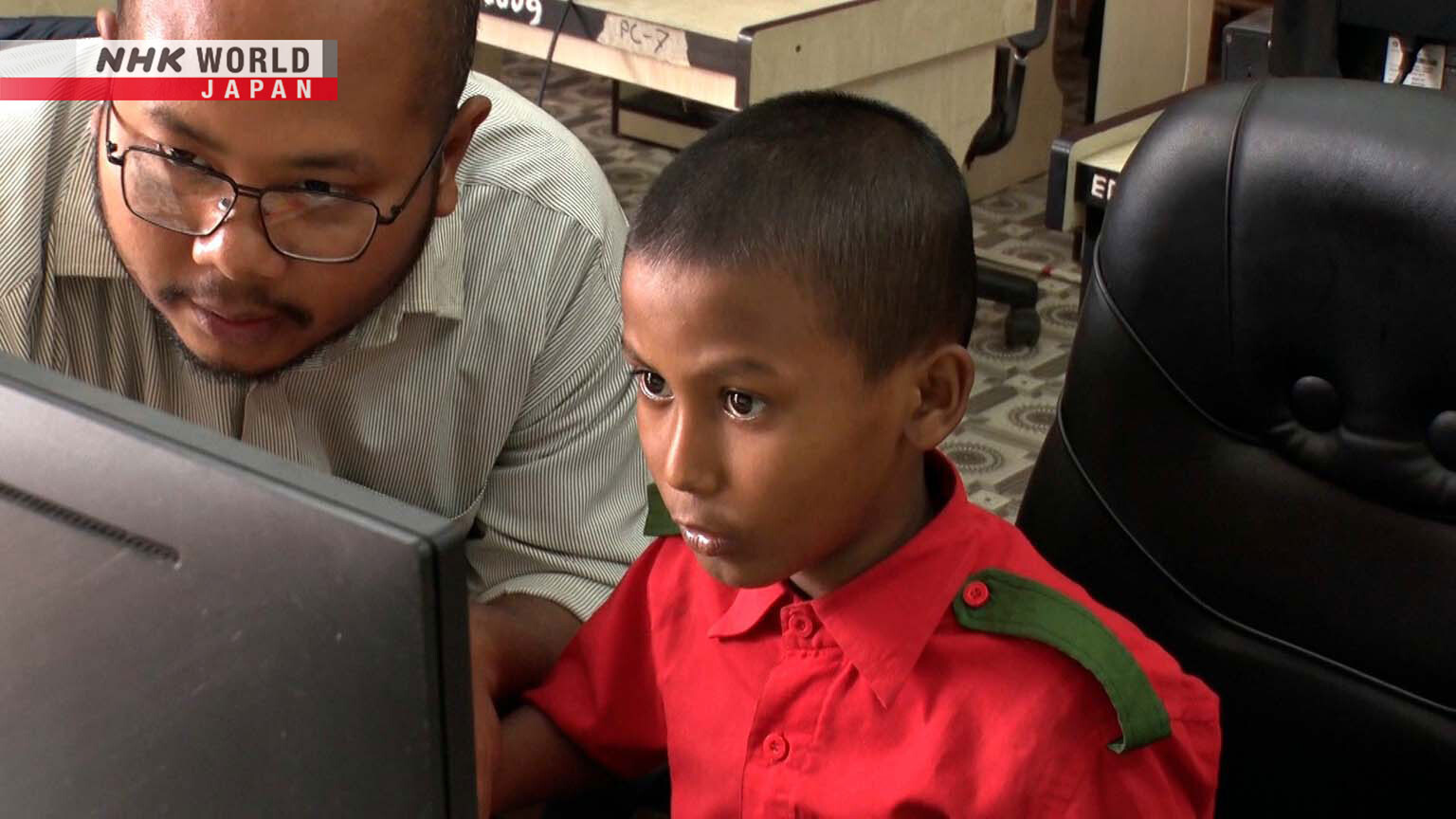Supporting Street Children - Watanabe Hiroki
Watanabe Hiroki is co-founder of an NGO in Bangladesh. It gives long-term support to underprivileged children on the street, proving that they can make a positive contribution to society.




Transcript
FRONTRUNNERS
I can't give him an education.
I want no child to be neglected. That's the world I want to see.
Supporting street children
Watanabe Hiroki
In 2009, a Bangladeshi film called "The Whirlpool"
had a deep domestic impact.
A young boy travels to the capital, Dhaka, to escape poverty.
But he and other children living on the street
become involved with a criminal organization.
Hey, don't cry. A big guy used to beat me up, too.
He arrived yesterday, but doesn't know anyone. So I brought him along.
Work for me and you'll be safe.
I'll give you a bag of drugs.
The film starred children who once lived on the street,
raising awareness of the issue.
It was screened internationally, including in Japan.
Fifteen years later...
Bangladesh's economy is improving rapidly.
The World Bank predicts that in 2026,
it will no longer be classified as a "Least Developed Country."
But among the 170 million residents,
UNESCO reports that there are still over 3.4 million children
who live on the streets.
Ekmattra Society is a Bangladeshi NGO that supports these children.
It actually produced the film, "The Whirlpool."
One of its leaders is Watanabe Hiroki, from Japan.
In 2004, he founded the NGO with his classmates
while studying at the University of Dhaka.
Our main goal is to help children.
We offer long-term support, until they achieve independence.
Until their lives improve.
Film director Shubhashish Roy is a co-founder
and executive director of the NGO.
He's also the creator of "The Whirlpool."
Ekmattra accepts donations.
But it's also funded by Watanabe's consulting business
and Shubhashish's film productions.
This lets them support the lives and education of underprivileged children.
Here's what "Ekmattra" means.
"Together we stand. Together we unite."
We value long-term planning and continuous support.
Much of that support takes place at Ekmattra Academy,
a free boarding school located around 170 kilometers north of Dhaka
in the region of Mymensingh.
There are six buildings in an area the size of two soccer fields.
The 50 children, aged 4 to 16 years old, were all rescued from the street.
They attend public school nearby
while living and receiving supplementary lessons at the academy.
The goal is to help former street children become successful role models.
Ekmattra's support begins with talking to children on the streets of Dhaka.
Once a week,
Watanabe joins field associate Shihab Sarar Sumon on his daily rounds.
How are you?
They see a group of children they've never encountered before.
Soon, they strike up a conversation.
How many kids hang out here?
Watanabe plays some simple games with the children.
With a new group, he always starts with play.
That's his regular approach.
You can't start with, "Where are your parents?"
"Do you have money? Where do you sleep?"
Children react negatively to that sort of interrogation.
First, you need to become their friend.
Watanabe builds trust while talking to the kids.
But the academy can only accept a couple new children each month.
The most important factor is motivation.
They must want to change their lives. To study hard and succeed.
Otherwise they flee the academy, or decide they prefer life on the street.
So I'm always thinking about how to inspire that motivation.
It's been 20 years since Watanabe and his colleagues set up the NGO.
Economic growth led to fewer street children,
but COVID-19 reversed that trend.
The children live in constant danger,
surrounded by organized crime and temptations like glue sniffing.
Shihab and Watanabe find a boy sitting alone.
They've never seen him before.
They play games and learn that he's waiting for his father to return.
He's around five years old, a crucial age for rescuing children.
In a few years, he may start sniffing glue. Change would be difficult.
So I want to meet his father.
After a while, the boy's father returns.
He sells cardboard, and leaves his son here while stocking up.
Will you send him to school?
Only if you can.
That's not his only option.
The father explains that they live in the slums.
He sends his two older children to school
but can't afford to do the same for his youngest.
Watanabe makes a suggestion.
Several support groups run schools in this area.
Those schools could really help him.
He still has both parents here, so the academy might not be for him.
But on the streets, he doesn't have the opportunity to grow.
So I can introduce his father to a nearby NGO.
He said he'd think about it, and meet me again.
A child is set to join the academy tomorrow.
Watanabe makes a final visit.
This is seven-year-old Mohamed Tamim Akash.
His parents disappeared when he was two.
He has been raised by his aunt since then.
She sells toothbrushes in this area every day.
But she worries about what Akash does during that time.
He's been talking with our staff for about three weeks.
He says he wants to join the academy and study.
I want to learn, play, and help out.
And become a good person.
I want him to go to the academy.
He can study and make something of himself. There's nothing for him here.
I can't give him an education.
Shihab goes through paperwork explaining Ekmattra's philosophy
and how it works.
Akash's aunt signs the document.
Watanabe and his colleagues will support him until he becomes an adult.
Akash and his aunt will be able to meet once a month.
But the academy is a long way away, making frequent visits difficult.
The next day.
Akash travels 170 kilometers north of Dhaka to the Ekmattra Academy.
They arrive after a four-and-a-half-hour drive.
Akash takes the first step on his new journey.
Louder!
The children always gather to greet new arrivals.
I'm Akash.
- I'm Puran.
- I'm Akash.
Akash is taken to a shared room.
This will become his new home.
Stay back, everyone.
Up you go.
This is your space.
Time for a round of applause!
The Ekmattra Academy is located in the countryside.
It offers the children a green, comfortable environment.
As Akash plays with the others, he seems to relax.
Watanabe and his colleagues used to run a facility in Dhaka.
But they moved to this location six years ago.
Dhaka is big and crowded. Everyone competes with each other.
But we focus on compassion and empathy.
How can you care for others and not just yourself?
That's the leadership we want to cultivate.
So we built a school away from the city, surrounded by nature.
Everyone eats together, three times a day.
The food is prepared by a full-time cook.
For Akash, it's his first meal in his new home.
The children gradually adapt to the rules and expectations of communal life.
So how did Watanabe end up working with children in Bangladesh?
During my fourth year at university, I visited Thailand and saw a slum.
There was a really scruffy boy, maybe five or six years old.
I was on a double-decker luxury bus. Our eyes met and I was taken aback.
Why was I looking down from a bus, while he was looking up from a slum?
The disparity made me angry, bitter, and sad. I was overwhelmed.
Children should be able to build a life, regardless of their circumstances.
And I knew I wanted to help make that happen.
Watanabe resolved to devote his life to helping these children,
and chose to focus on Bangladesh,
one of the world's "Least Developed Countries."
He enrolled at the University of Dhaka.
His new friends were studying a variety of subjects
like Shubhashish, who focused on film production.
Many of them shared his goals,
and together they set up the Ekmattra Society.
Meeting Shubhashish and the others was a big turning point for me.
We learned a lot from each other.
They helped me see where Bangladesh is heading, and how we could help.
We saw lots of impoverished children around the university.
They were begging, or selling flowers and cigarettes.
And we realized that those kids were in serious trouble.
If we could give them an education, we could really change their lives.
Watanabe and his colleagues started in 2004 by offering outdoor classes.
Eventually, they built a children's home in Dhaka.
But people had a limited understanding of the problem,
and donations were few and far between.
They filmed "The Whirlpool," with Shubhashish as the director,
in order to raise domestic awareness about the plight of street children.
Its success brought Ekmattra's work to public attention.
The film drew profits and publicity,
which helped fund construction of the Ekmattra Academy.
The school opened in 2018.
There, each day begins with a bell.
The children attend a morning assembly.
Good morning.
Good morning!
Let's all work together to make this a happy day.
Afterward, there are morning classes for children
who haven't yet started public school.
Classes are designed to encourage enthusiasm
for learning and problem solving.
Here, the children are drawing shapes on a computer.
Akash pays close attention.
It's the first time he's ever used a computer.
I'm learning.
See my drawing?
It's really fun.
In the afternoon,
there are lessons for the children who are returning from school.
Some academy graduates have gone on to attend
Bangladesh's top high schools and universities.
Current students have many different hopes and aspirations.
I want to be an architect.
I'd like to design and construct buildings.
I'm going to be a social worker.
I want to help kids like me.
We grow a lot of fruit in Bangladesh.
I want to export it abroad.
There are seven members of the teaching staff.
All of them have extensive experience working in education.
The principal is poet and former English teacher Muhamed Abu Kawser Sarker.
For many years, he wanted to work with underprivileged children.
Then he came across Ekmattra.
The kids have spent time on the streets, so they have many problems.
Their rights weren't respected. And that pain has built up.
Ekmattra rescues them and puts them on the path to a happy life.
My challenge is to build trust.
We think of the principal's job as extremely important.
Can they emotionally connect with the kids?
Are they a good role model for the children they're raising?
We spent a long time searching for the right candidate.
In the academy's fields, the children try farming.
They harvest vegetables that are then cooked for their meals.
By working together,
they learn about food as well as how to look out for each other.
The staff hopes that this will help them become more empathetic.
Ekmattra is currently working on a new film
about the plight of underprivileged children.
It's been 15 years since "The Whirlpool."
Shubhashish will once again write and direct.
The new film is about a boy born into a wealthy family
who somehow ended up living on the street.
While his father tries to find him,
he becomes swept up in a life of crime and drug use.
The first draft of the story is complete,
and discussions are underway about the portrayal of the children.
I want to show the city of Dhaka.
In the last 10 to 12 years, drug use has increased.
Research shows that more people are sniffing glue.
When we made the last film, bottled drugs were widely used.
Glue sniffing wasn't common, so we didn't show it.
Now, kids are doing it after one or two weeks on the street.
What inspired Watanabe and his colleagues to make a new film?
We made "The Whirlpool" 15 years ago.
But the situation hasn't improved. It's gotten worse.
I want people to see what's happening to these kids.
I want them to realize this isn't someone else's problem.
That's how we can change people's behavior.
I want to make viewers feel
some responsibility toward the children.
I hope the film changes viewers' assumptions.
I hope they see the importance of supporting the kids.
Today is March 26th.
Bangladesh's Independence Day.
Shubhashish and Watanabe travel from Dhaka to the academy.
With everyone in attendance, flowers are laid at a monument on site.
For Ekmattra Academy, this is also graduation day.
This year, six students received national academic certificates
and will leave the school.
Some plan to go to university.
Others will find work.
As they follow their own paths,
Ekmattra will continue to support them
through scholarships and other methods.
The representative of the graduates gives a speech.
I've been here for ten years.
I arrived when I was six or seven,
the same age some of you are now.
We're forging our own paths, and we hope to make you proud.
We're rooting for you, too.
Next, everyone lines up for a commemorative photo.
For the graduates, it's a new beginning.
Watanabe offers some encouragement.
You have so much potential.
I hope you carry on working hard and have a wonderful life.
We've spent a lot of time together, so this is joyful, but also sad.
I hope the academy prepared them all for the next stage of their lives.
I want to see them spread their wings.
Ekmattra's graduates have started new lives and taken on new challenges.
This is a major international trading company in Dhaka.
Employee Shamin Yasar Raju was rescued from the street
when he was seven years old,
and studied with Ekmattra until he was 18.
He was one of the children in "The Whirlpool."
A Japanese man called Watanabe Hiroki invited me to his children's home.
I burst into tears, saying I didn't want to go.
He persuaded me that studying would improve my life.
Now I truly understand what he did for me.
Watanabe wants to produce many more graduates like Shamin.
He hopes to convince people that street children aren't a burden to society.
But after 20 years of work, public awareness hasn't changed much,
and the number of children living on the street is increasing.
Watanabe sometimes feels powerless.
So we asked, "What is it that motivates you?"
I believe in children's potential.
With an education, they can achieve great things.
But at the moment, they're being neglected.
They could shine so brightly.
But despite economic improvement, society is leaving them stranded.
Things are getting worse, and it makes me really angry.
We want to build a society where no kids live on the street.
And we're determined to see that in our lifetime.